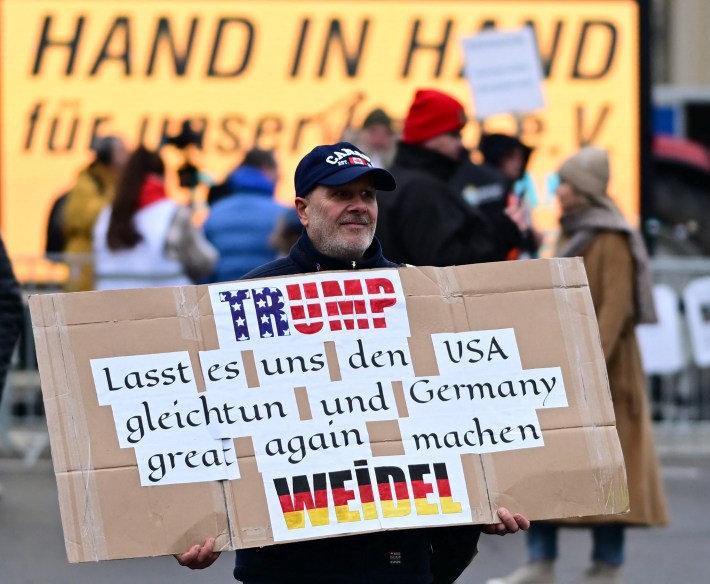BERLIN — When Germans woke up on the morning of Nov. 6, it felt like déjà vu: Once again the country had been on the edge of its seat following the U.S. presidential elections, with a qualified left-leaning female candidate losing to an erstwhile reality star turned right-wing political icon. And once again, there was the question: What now?
Germany's relationship with the U.S. is based on decades of economic ties, shared democratic values, and strategic cooperation on multilateral issues, particularly global security concerns. While a certain anti-Americanism has always persisted in Germany, especially since the U.S. invasion of Iraq in 2003, and German public opinion on the United States fluctuates significantly with whoever is president at the time, the majority of Germans consider the U.S. to be a key partner.
But Donald Trump's first presidential term strained the relationship between the two countries, particularly when it came to trade policies, defense spending, climate change, and global diplomacy. Germany and the EU are not wholly unprepared this time around. The world is familiar with Trump; international state actors have a better idea of his motivations, how he thinks, and how they need to approach him to get him to do what they want. Nonetheless, the disappointment over Kamala Harris's loss has also been felt deeply here, as has bewilderment over how Trump could not only win a second time but also win by a much larger margin. Former Chancellor Angela Merkel even expressly hoped for a Harris win in her memoirs, written before Election Day but published after.
Bernd Pickert is the editor of the foreign desk at Die Tageszeitung, a national German newspaper, and covered the weeks leading up to the election. In retrospect, he thinks that there were several key mistakes in Harris's campaign, including a lack of urgency in addressing undecided voters, a spotty media presence, and undefined policy stances. But he and his peers still thought the race would be tighter than it was.
"When Harris's candidacy was announced, there was a sudden surge in the polls. Especially in September, during the TV debate, there was a noticeable peak. But then the polling numbers started stagnating," Pickert says. Nonetheless, they showed Harris with a slim lead. Pickert looked at polling results for the same period during the last two presidential elections and came to the conclusion: "Either the polls are wrong in the same way and by roughly the same margin as in 2020, in which case Trump wins outright. Or the methodology has improved somewhat, and this phenomenon of people being embarrassed to admit to a pollster that they're voting for Trump is no longer present, which means the current polls would be more accurate. The latter possibility gave us a glimmer of hope."
The world is not the same place as it was in 2016; the geopolitical landscape is vastly different. Russia has since staged a full-scale invasion of Ukraine, with U.S. and European Union military support for Ukraine playing a key role. U.S.-backed Israel is waging war on Gaza and Lebanon, leaving the entire region destabilized. It is a critical time for transatlantic relationships. But Trump's election as the 47th president of the United States has thrown a wrench into the equation, leaving Germans wondering what the next four years have in store, both globally and domestically.
Dr. Joseph Vogl, a media scholar and permanent visiting professor at Princeton University's German Department, has struggled to get his head around the election. "I've been coming to the U.S. regularly since 2005,” he says. “The longer I've been here and the longer I've spoken to people, listened to the news, and observed the country, the stranger it becomes to me."
One day after the election in the United States, Germany faced its own political upheaval: The country's governing coalition went kaputt. Chancellor Olaf Scholz is dealing with a vote of confidence in December, Finance Minister Christian Lindner was sacked, and snap elections have been called for February. Suddenly, Germany finds itself in the midst of its own campaigns, with the most recent political developments in the United States casting a long shadow over the next few months.
One of the things that caught Pickert's attention during his coverage of U.S. elections was how the deeply anti-democratic nature of Trump's rhetoric and proposed policies failed to deter voters. Neither did his history as a man who urged an insurrection against the U.S. Capitol, and was convicted of a felony, not to mention being accused of multiple sexual assaults. A centerpiece of the Harris campaign was pointing all of this out, repeatedly, and it didn't work. Pickert is unsettled by the parallels. "What does this mean for our approach toward the AfD [the far-right Alternative for Germany party], where a significant part of anti-AfD activism, both from society as well as from other parties, consists of pointing out how anti-democratic and dangerous they are?"
Germany is experiencing its own lurch toward the right, with the AfD enjoying growing popularity among young voters and currently polling at 17 percent nationwide, making it the second-most popular party. Trump's win has also lent legitimacy to many AfD policies and beliefs, at least in the minds of the party and their supporters.

Vogl predicts that while the official German and EU position will probably be one of distance toward the U.S. post-election, the domestic discourse will be more fragmented and take certain cues from Trump. "It's not taboo in Germany anymore to call for deportations, or 'remigration'," Vogl says. "These are things that have been building for a while, and we will be seeing an inner-political alignment toward the USA, especially from certain parties."
The candidates of the main parties, such as the Social Democratic Party of Germany (SPD) and Christian Democratic Union of Germany (CDU), will present themselves as voices of reason. "Olaf Scholz or [CDU candidate] Friedrich Merz, as well as the Greens, will try to find a way to continue working together with the USA while also confidently establishing certain boundaries that will not be crossed," says Dr. Dominik Tolksdorf, an Associate Fellow at the German Council on Foreign Relations. "The Greens will also call attention to the threat to democratic values and position themselves as supporters for a tolerant and progressive Europe."
The AfD’s pitch was even easier to predict. "Many in the AfD are now saying, 'Look, the majority of voters in the USA also agree that unchecked immigration and open borders are an issue,’” Tolksdorf says. “[They'll say] it's not just a European issue, the majority of Americans are concerned about this too."
In Berlin, the concern over Trump's view of Europe—basically, that we're freeloaders who have relied on America bankrolling us on trade and defense for too long—was evident in the Foreign Ministry's statement after Trump's projected win. Foreign Minister Annalena Baerbock, who had just returned from Ukraine, (diplomatically) expressed her thoughts about what Trump's win may mean for the future of that country: "We Europeans will have to take even more responsibility for our own security policy—this is now clear after this election day in the USA—especially within NATO." Merkel put it more bluntly in a recent interview with Der Spiegel magazine: "For the world and for multilateralism, Trump is a challenge."
"One of the main concerns for Germany right now is certainly the security policy aspect, especially in regards to NATO and Ukraine," Tolksdorf says. "And then there's of course the issue of trade. But I think Germany and the EU can prepare more on that last point because we now have a better idea of the issues [Trump] cares about. He wants to reduce the USA's trade deficit with other countries, particularly with China but also with the EU."
If Trump decides to sacrifice Ukraine, then Europe will have to take a different approach: "It's about mutual dependability," Tolksdorf explains. "If the EU realizes that it's impossible to work with Trump [on this matter], it's very possible that there will be significant attempts made to become less dependent on the United States and focus on strengthening security policies here." Europe failed to do this in 2016, but there also wasn't a full-on war raging in its backyard at the time. If Germany and the EU do end up moving away from the United States in security matters and pledge to take a more active role in military operations in Ukraine, it would be the first time since World War II that Europe may have to play a principal role in a war on the continent. But it's not just about Europe: While an American pullback would signal to Vladimir Putin that his imperialist ambitions need not stop at Ukraine, China will be observing closely as it ponders the consequences of an attack on Taiwan.
There, Trump's transactional approach to politics could possibly be leveraged to stop the worst from happening, Tolksdorf believes: "Trump could threaten to withdraw from NATO or question the validity of Article 5's joint duty of assistance. European allies could then offer to scale up their own defense and expand their contributions within the NATO alliance. This would signal to Trump that it would be beneficial to continue having the Europeans as allies and for the United States to stay in NATO, also because Europe can be an important ally in the systemic rivalry with China, for example."
Countering populist far-right discourse anywhere in the world requires more than just condemnation, as the past few years have shown across Europe and beyond. "What we have been doing up to now has clearly not been working," Pickert says, arguing that left parties fall into what he calls the "trap of permanent provocation from the right."
"What was noticeable during the U.S. electoral campaign was that Trump relied significantly on provocative statements designed to trigger a reaction and cross boundaries so that Democrats were stuck in a cycle of constantly reacting to him and condemning what he said," Pickert says. "This overshadowed any of the Democrats' actual messages."
That doesn't mean what worked in the U.S. will work in Germany. "The U.S. media system has been decimated over the years," Vogl says. "Fox News has more viewers in the U.S. than CNN and MSNBC together." Along with the proliferation of social media as a primary news source, the U.S. is undergoing "a privatization of the public," as Vogl calls it. In Germany, on the other hand, public media still maintains a certain level of protection, although parties like the AfD are clamoring for it to be dismantled.

All of this doesn't change the fact that the rise of the right is not a purely American phenomenon, nor is it a German one. We're seeing right-wing populist discourse gain popularity and even real power in places like the Netherlands, France, Italy, Finland, and Romania, while countries like Hungary and Russia have set the tone for autocratic leaders in the 21st century. It's therefore a bit more difficult for people in Germany to look at the United States, shake their heads at Trump voters, and write them off as an aberration. It's happening here too, after all.
Pickert says the German media coverage of the U.S. elections in Germany was very different from what it was in 2020. This time around, there was a more concerted effort to actually understand why Trump evoked such enthusiasm. "Previously, there was more of a sense of, 'Look how crazy these people are.' But now I think there's been a change, especially since we're facing something similar. Of course, there are significant cultural and political differences between Germany and the USA, so you can't make a one-to-one comparison. But certain key points anchored in the far right, such as the Great Replacement Theory, go beyond borders."
After Trump lost the 2020 election, there was a general sense among Germans that the Trump era was over, and that the MAGA movement would lose steam. It was a glitch, a bad dream, a momentary lapse in judgment on the part of the American voters. That certainty is gone, as is the paternalism. The view here of America after the elections is less as a fluke, and more as a warning sign of things to come.
"I've been reporting on the USA for over 30 years," Pickert says. "There were many things that exasperated me. But this has a new quality. This is new territory."





